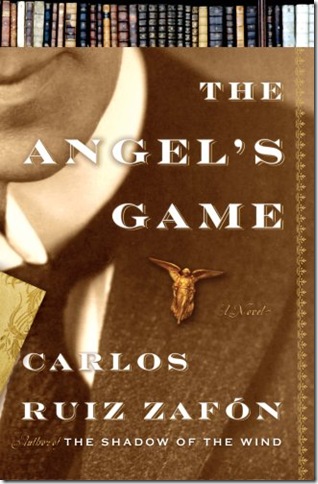 Carlos Ruiz Zafon, author of the international bestseller The Shadow of the Wind, poses an affront to those serious readers who believe they know what makes for literary quality. What to do with a novelist, clearly motivated by a popular rather than artistic impulse, who nonetheless writes with wit, skill and creative energy?
Carlos Ruiz Zafon, author of the international bestseller The Shadow of the Wind, poses an affront to those serious readers who believe they know what makes for literary quality. What to do with a novelist, clearly motivated by a popular rather than artistic impulse, who nonetheless writes with wit, skill and creative energy?
Zafon’s new novel, The Angel’s Game, is the story of a writer who sells his soul to the Devil, and then tries to solve the byzantine mystery that might get it back. Set in Barcelona in the 1920s, it shares the mood, the narrative power, the love of books, and some of the characters of its predecessor. If anything, it is better. It is certainly darker.
The hero and narrator, David Martin, is a poor young writer who gains a measure of success hacking out pulp crime fiction for a disreputable publishing company. Appearing under the series title City of the Damned, these books are hugely popular. But Martin’s name does not appear on them, and he receives only a small portion of the riches they earn. What’s more, he works under ruinous deadlines, churning out thousands of words of morbid melodrama each week.
After a few years, his health starts to suffer, he pines after a beautiful young woman who marries his best friend, and he resigns himself to death from a brain tumor, not yet quite 30.
Martin’s fortunes improve when he is solicited to write a book for a mysterious French publisher, Andreas Corelli. This project is not to be a novel, but a fable — one that will establish a new religion that men will be willing to kill and die for. In return, Corelli promises Martin a fortune, a cure for his illness, the fulfillment of his desires. It does not, of course, quite work out that way.
This is merely the setup for a gothic romance of breathtaking imaginative richness. Most writers would get an entire novel out of the newspaper setting at the beginning, while even the most secondary characters are fully knowable and appealing. Consider the deputy editor, Don Basilio Moragas, “a forbidding-looking man with a bushy moustache who didn’t suffer fools and who subscribed to the theory that the liberal use of adverbs and adjectives was the mark or a pervert or someone with a vitamin deficiency.”
Given the religious theme at the heart of this novel, it is worth noting that Zafon’s own faith lies in the power of books, writing and reading. Fans of the earlier novel will be delighted by the appearance of the Cemetery of Forgotten Books, a vast secret repository where volumes no longer read are lovingly preserved.
In The Angel’s Game, though, literature, like any faith, can destroy as well as sustain. Devotion to it nearly destroys Martin, while Zafon, in perhaps his most audacious gambit, implies that the pernicious parable of Corelli’s book provides the dark magic that brings Nazism into existence.
Zafon has a distinct skill for eating his cake and having it, too. The Angel’s Game is a send-up of cheap fiction, but one that uses every trick in the penny-dreadful arsenal – sexy witches, corrupt cops, doomed romance, madness, a gothic mansion with secret rooms, endless cliffhangers, betrayals, heroics. This is a very old-fashioned kind of novel – not one thing about it is new, and yet everything seems fresh.
Zafon’s secret is his apparently boundless inventiveness, coupled with narrative style that is at once delicate and sinewy, graceful and propulsive. Dialogue is lively and often aphoristic — especially when Corelli is speaking: “Silence makes even idiots seem wise for a minute.”
Not all the tantalizing elements Zafon throws into the book are fully realized. Martin comes under suspicion for a series of murders that seem to benefit him. Signs that he may actually be the killer, as when he discovers unexplained spots of blood on his face, go nowhere. Most troubling is the climactic sequence, an action-packed crime thriller parody that runs counter to the psycho-spiritual drama that precedes it. Could a dissolute novelist really be able to run all over the city, fighting off three experienced police detectives along the way?
If The Angel’s Game is less than perfect, it still casts a narrative spell that, like The Shadow of the Wind, will remind some of us why, as children, we fell in love with reading in the first place. Perhaps it is no coincidence that Zafon started as an award-winning young-adult author.
In any case, Zafon joins that list of genre novelists –Wilkie Collins, Eric Ambler, H.P. Lovecraft, Daphne du Maurier, Philip K. Dick, Patricia Highsmith, Stephen King, J.K. Rowling, to name a few – who by dint of craftsmanship and imagination challenge the very idea of a barrier between popular and literary fiction. If The Angel’s Game is little more than a guilty pleasure – well, sometimes that is enough.
Chauncey Mabe, the former book editor for the Sun-Sentinel, can be reached at cmabe55@yahoo.com. Visit him on Facebook.
THE ANGEL’S GAME. By Carlos Ruiz Zafon, translated from the Spanish by Lucia Graves; 531 pp.; Doubleday; $26.95.